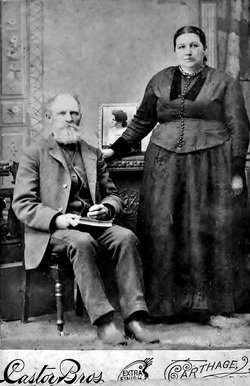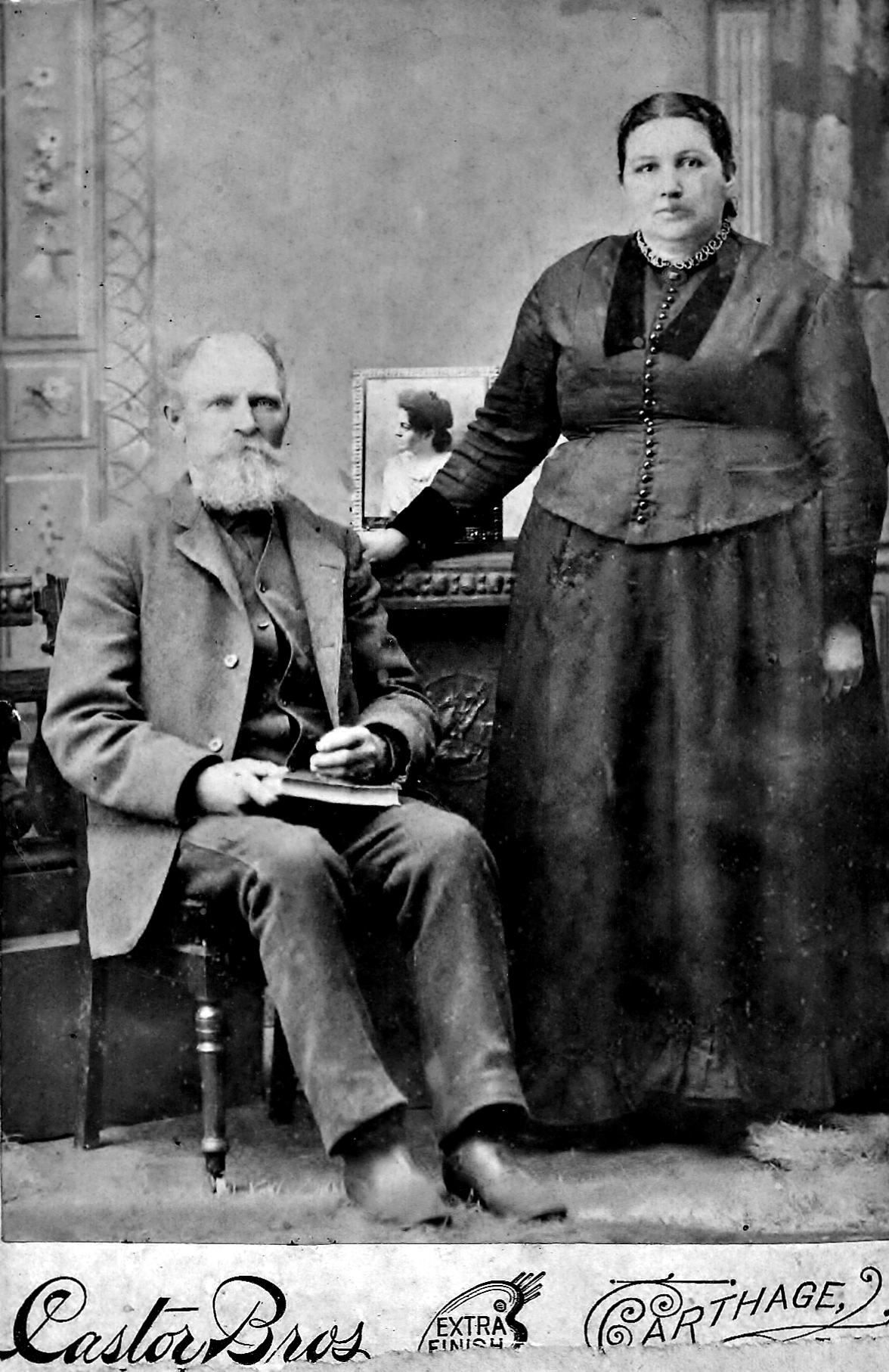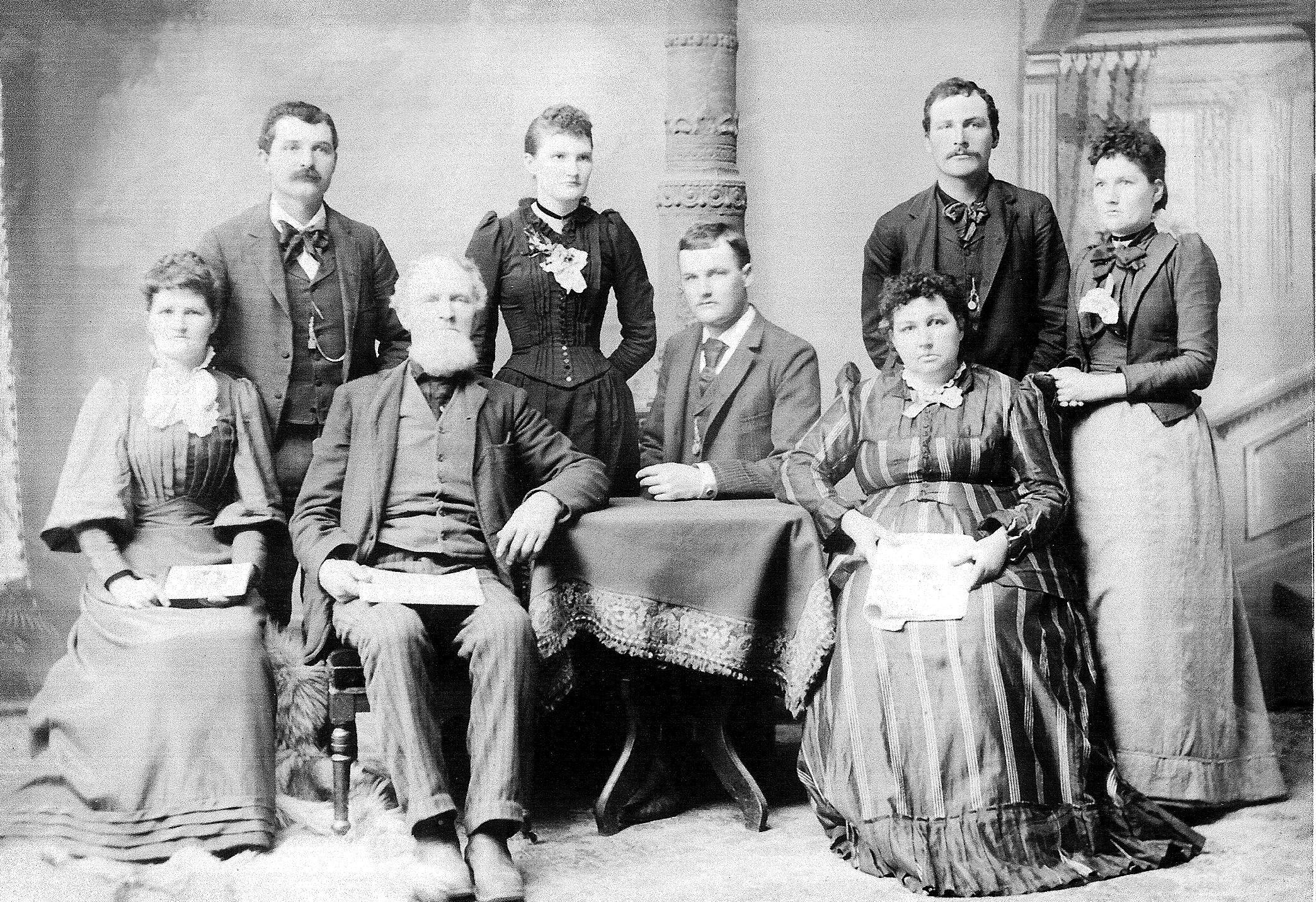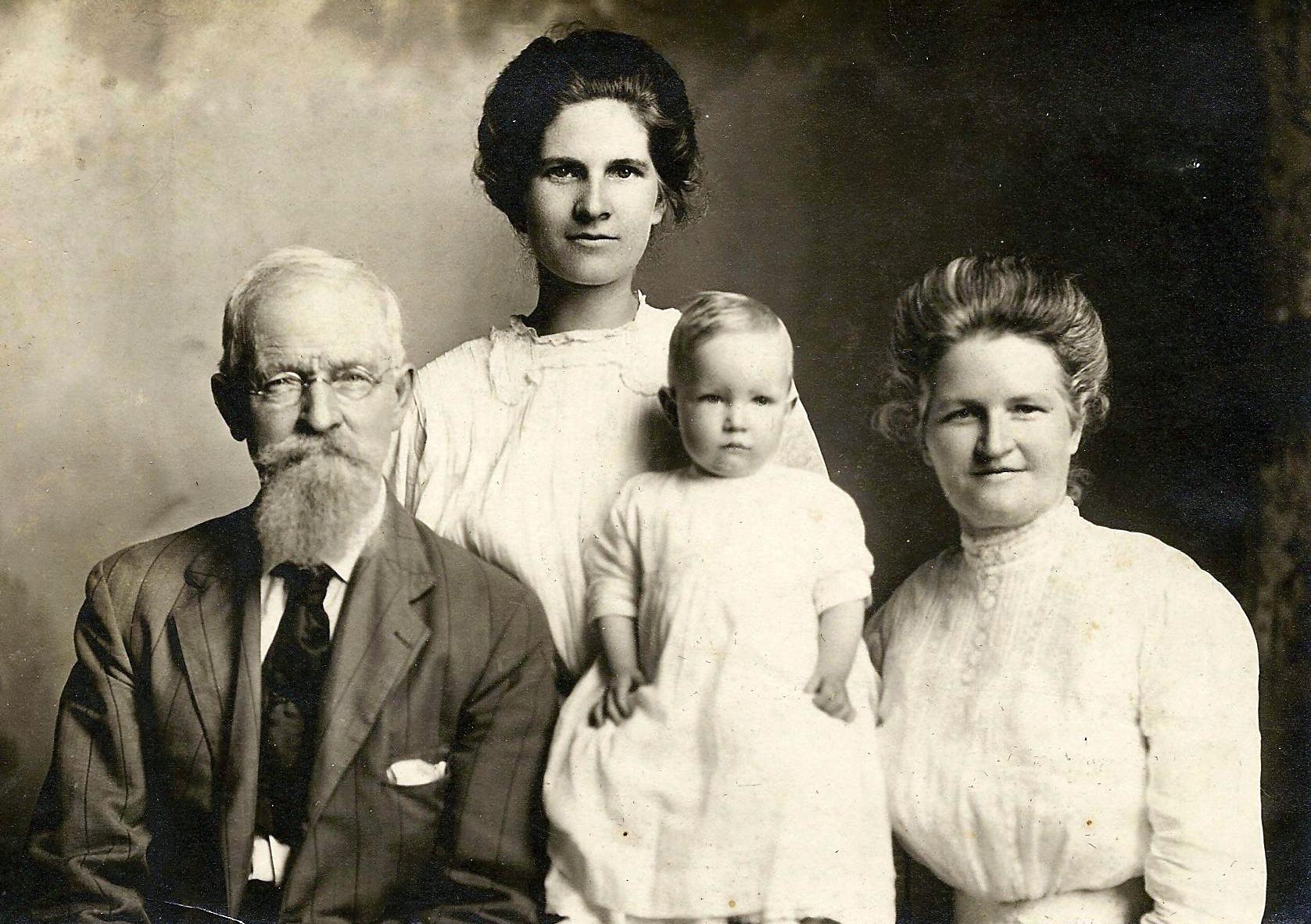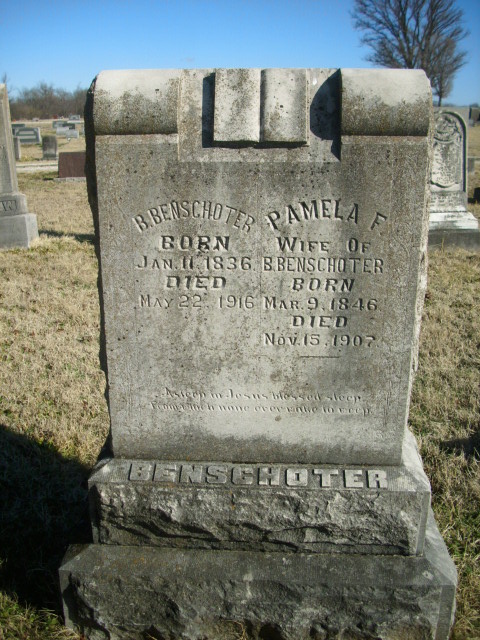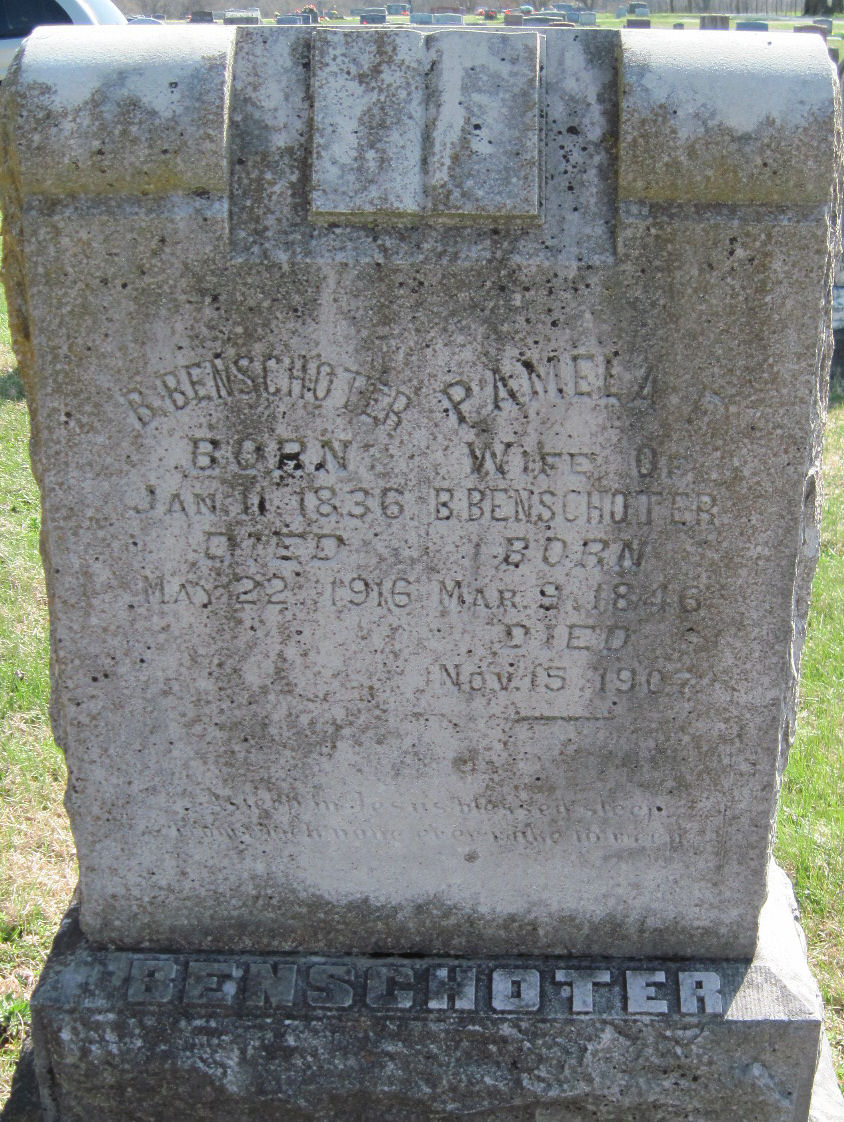BURGESS BENSCHOTER IS DEAD
End Comes to Retired Farmer, 80, at Home of Son
Burgess Benschoter, 80 years old, a well known retired farmer, died at 10:16 o'clock last night at the home of his son, George Benschoter, who resided five miles south of Carthage. Death was due to paralysis and kidney trouble. He had been seriously sick a week, but had been in poor health for some time.
Mr. Benschoter was born January 11, 1836, near Toledo, Ohio. He came to Carthage from Nebraska and was engaged in farming until advanced age caused him to retire from active business life. His farm was 9 miles south of the city, and he owned a place there at the time of his death.
Since the death of his wife nine years ago he had made his home with his children.
The following children survive: Mrs. Laura Lett, of Joplin; George L. Benschoter, residing south of Carthage; Frank M. Benschoter of Webster, Texas; A. V. Benschoter, of Diamond; Mrs. D. W. Spence, of Diamond; Mrs. W. L. Paul, of Bower Mills. Four children died in infancy.
Mr. Benschoter was a member of the Baptist church and was highly respected by all who knew him.
Funeral services were conducted this afternoon at the Benschoter home and the body was buried in the Stone cemetery.
The Carthage Press, Carthage, Missouri
Thursday, May 25, 1916, Page 6
____________________________________
Birth and Early Life Burgess was born on a farm in Berlin township, Erie county, Ohio, near Toledo, to Milo and Sarah (Hollister) Benschoter. They came from a long line of Van Benschoters, or Van Benschotens in this country. His parents both died in 1839 when he was just three.
Burgess had four siblings, according to a biography of the Benschoter family, Concerning the Van Bunschoten or Van Benschoten family in America written by William Henry Van Benschoten in 1907. All were boys. The two oldest, Ralph and Dwight died young. Hubbard Hollister was born in 1833, Burgess in 1836, and Oliver in 1839.
Uncle Curtis, brother to Milo, who had an adjoining farm, and who was guardian to the children, arranged for the care of Hubbard and Burgess, in exchange for Milo's farm, by the family of Theophilus Church. The Church family were fine people and cared for the children well. Oliver, in exchange for $50 a year, was to be cared for by the family of Oliver Peake.
Burgess stayed in the Erie county area all his youth. In 1850 he was living with Charles and Mary Hine, farmers, and going to school as well as helping out on the farm.
Moving West and Falling in Love By 1860, he had arrived in the Pleasant Valley area of Richardson county (Speiser), of the Nebraska Territory. He worked as a farm laborer there, but was not without some resources--personal property worth $100--probably his horse and saddle, and household belongings. He was working on a farm near John and Adelia Craig and their family, including their daughter, Permelia (Pamela), who had spirit and a sense of adventure, as well as good humor. This was a young woman worth courting!
On September 28, 1862, Burgess (age 26) and Pamela (age 16) married in Speiser, Richardson county, Nebraska. They lived there for a while and their two oldest children, Laura and George, were born there. After the war was over, they traveled into Kansas, and finally landed in Jasper County, Missouri, near Diamond, about 1867. This is where they established their farm and raised their children.
Family Burgess and Pamela had ten children, six would survive childhood--Laura, George, Frank, Vernie, Berta, and Anna. Their last four children did not--Hubbard Craig, Levivian Toliver, a stillborn infant, and Edward Dean.
Life on the Benschoter Farm Laura's daughter, Edna, wrote (in 1955) about visiting her Grandfather Burgess Benschoter's farm before the turn of the century when she was just a little girl with her younger sister, Belva. That narrative helps envision the working farm with its variety, and the skills, intelligence and ingenuity it took to manage it, as well as the humor and lessons to be learned there.
Turkeys: "They had an old turkey tom who so forgot his gender that he made a nest and sat on it. Uncle George and Uncle Frank supplied the nest with croquet balls, and the tom stayed on the nest in the hot sun until Grandfather, taking pity on the silly old bird, made the boys take the balls away and shoo him off".
"Grandfather had to use surgery on one of the little [turkey] fellows. He had, somehow, tried to swallow a six-inch piece of a very stickery gooseberry brier and it had protruded out his crop and through the skin. Grandfather made the hole larger, pulled out the brier, and sewed him up. It healed beautifully and another turkey was saved."
Beds: "Our bed was the best to be had--a four-poster laced two ways with small rope. On this was a big, thick straw mattress. Each year after Grandfather had had his wheat thrashed, the straw tick was emptied, washed, and taken to the straw stack. There it was stuffed and stuffed with the new straw until it could hold no more. 'Be sure and punch it back into the corners good!' What a treat to sleep on that fresh, sweet-smelling bed!" Edna later describes adding a "fat feather bed" on top of the straw mattress during the winter for warmth.
Breakfast: "Those never-to-be-forgotten breakfasts--hot biscuits, fried ham, cold milk, apple butter. The cold milk was in a big white pitcher by Grandfather's plate so that he might keep our mugs filled."
Apple Butter: "We had a hand in making that apple butter. The apples had to be brought up from the orchard, a mounting pile of them, all to be peeled and quartered. It seemed a never-ending job to me, but Grandmother, Grandfather, uncles and aunts kept everlastingly at it until there was enough to fill a sixty gallon copper kettle. A great fire was made out by the wood pile and allowed to burn down to coals. The kettle was hung by a stout pole between two upright stakes driven into the ground. The apples were then put in with cider which had previously been boiled down. Then came the fun. Grandfather had made a paddle about six or eight inches wide with holes bored into it. This was firmly attached to a long pole at right angle so that Grandmother could sit back away from the fire and stir the apples with comfort....If there happened to be a chilly wind blowing, Grandfather would rig up a wind-break to protect Grandmother."
Ducks: "They were silly quackers. Their feathers made lovely beds, but we did not like the feather-pulling time. In the spring of the year, Grandfather would round them up and Grandmother would seat herself out in the yard, take one on her lap, and begin."
Flowers: "The way that huge wisteria covered the house was a joy to see. Grandfather taught us how to make whistles of its twisty branches."
Snakes Threatening Birds: The sisters spied a distressed bird "fluttering its wings and making a pitiful noise". The bird was "about a foot in front of a striped snake stretched across some small limbs. The snake really did have the bird charmed and it seemed to have no power to get away. We rushed for Grandfather who rushed out and dispatched Mr. Snake. The little bird was so relieved and flew away. Grandfather cut the snake where there was a suspicious bulge and found a bird inside. How we did hate that snake!"
Rewards of plowing: "We followed after Grandfather's plow as he turned the brown earth. Our eager eyes watched for tortoise eggs and found many with the tough skin shells. Sometimes we would find snake eggs….We mashed the snake eggs."
Thrashing: "Grandfather got after us good and hot one day when he found us climbing up on top of the fresh thrashed straw stacks. He said we would furrow the stack and make it leak rain. But we were having a wonderful time. [Atop the stack, the sisters batted at dragonflies,] "speared them with a pin and anchored each to a board. Such treasures! Grandfather wasn't interested."
Lesson from Grandfather: "But Grandfather kept us in the straight and narrow way. I remember when I was about five years old, I stayed with Grandmother and Grandfather one winter and went to school. Aunt Anna and Aunt Hattie were the big girls casting sheep eyes at the big boys across the aisle.
Grandfather bought me a perfectly beautiful little Appleton's First Reader and I almost burst with pride. I was sick one day soon after and had to leave my pride and joy at the school house. The day before I was absent, I had promised one of my little friends that when I came the next day I would bring her a card. As I did not show up with the card as promised she retaliated by taking my precious little reader and tearing each page through the middle! Horrors! Imagine what I thought of her! When I told Grandfather he said, 'Now tomorrow you take her the card as you promised.' Heaping coals of fire, I guess, but those coals of fire burned me worse than they did her, I think. Yet it was a wonderful way to teach me to keep my promise."
Church preparation: "Church and Sunday School going was another momentous occasion. Saturday if it was a warm day, Aunt Annie and I filled up a tub with water and set it in the sun to warm up. How delicious to scrub in it and make ourselves clean for church. Grandfather had to shine his Sunday-Go-To-Meetin' shoes and see that his horses were groomed and the wagon [fit with] extra seats. His horses were his joy and he pridefully held back on the lines as they surged along the way."
Death Burgess died at age 83, his beloved wife, Pamela preceding him in death nine years earlier. He died on the farm on which he had worked and raised a family and lived. His children survived him, with their children living to tell the stories of that life.
In his will, written in 1914, he left each of his 6 children a 1/6 interest in his property, with his son George as executor.
~~mjp~~
BURGESS BENSCHOTER IS DEAD
End Comes to Retired Farmer, 80, at Home of Son
Burgess Benschoter, 80 years old, a well known retired farmer, died at 10:16 o'clock last night at the home of his son, George Benschoter, who resided five miles south of Carthage. Death was due to paralysis and kidney trouble. He had been seriously sick a week, but had been in poor health for some time.
Mr. Benschoter was born January 11, 1836, near Toledo, Ohio. He came to Carthage from Nebraska and was engaged in farming until advanced age caused him to retire from active business life. His farm was 9 miles south of the city, and he owned a place there at the time of his death.
Since the death of his wife nine years ago he had made his home with his children.
The following children survive: Mrs. Laura Lett, of Joplin; George L. Benschoter, residing south of Carthage; Frank M. Benschoter of Webster, Texas; A. V. Benschoter, of Diamond; Mrs. D. W. Spence, of Diamond; Mrs. W. L. Paul, of Bower Mills. Four children died in infancy.
Mr. Benschoter was a member of the Baptist church and was highly respected by all who knew him.
Funeral services were conducted this afternoon at the Benschoter home and the body was buried in the Stone cemetery.
The Carthage Press, Carthage, Missouri
Thursday, May 25, 1916, Page 6
____________________________________
Birth and Early Life Burgess was born on a farm in Berlin township, Erie county, Ohio, near Toledo, to Milo and Sarah (Hollister) Benschoter. They came from a long line of Van Benschoters, or Van Benschotens in this country. His parents both died in 1839 when he was just three.
Burgess had four siblings, according to a biography of the Benschoter family, Concerning the Van Bunschoten or Van Benschoten family in America written by William Henry Van Benschoten in 1907. All were boys. The two oldest, Ralph and Dwight died young. Hubbard Hollister was born in 1833, Burgess in 1836, and Oliver in 1839.
Uncle Curtis, brother to Milo, who had an adjoining farm, and who was guardian to the children, arranged for the care of Hubbard and Burgess, in exchange for Milo's farm, by the family of Theophilus Church. The Church family were fine people and cared for the children well. Oliver, in exchange for $50 a year, was to be cared for by the family of Oliver Peake.
Burgess stayed in the Erie county area all his youth. In 1850 he was living with Charles and Mary Hine, farmers, and going to school as well as helping out on the farm.
Moving West and Falling in Love By 1860, he had arrived in the Pleasant Valley area of Richardson county (Speiser), of the Nebraska Territory. He worked as a farm laborer there, but was not without some resources--personal property worth $100--probably his horse and saddle, and household belongings. He was working on a farm near John and Adelia Craig and their family, including their daughter, Permelia (Pamela), who had spirit and a sense of adventure, as well as good humor. This was a young woman worth courting!
On September 28, 1862, Burgess (age 26) and Pamela (age 16) married in Speiser, Richardson county, Nebraska. They lived there for a while and their two oldest children, Laura and George, were born there. After the war was over, they traveled into Kansas, and finally landed in Jasper County, Missouri, near Diamond, about 1867. This is where they established their farm and raised their children.
Family Burgess and Pamela had ten children, six would survive childhood--Laura, George, Frank, Vernie, Berta, and Anna. Their last four children did not--Hubbard Craig, Levivian Toliver, a stillborn infant, and Edward Dean.
Life on the Benschoter Farm Laura's daughter, Edna, wrote (in 1955) about visiting her Grandfather Burgess Benschoter's farm before the turn of the century when she was just a little girl with her younger sister, Belva. That narrative helps envision the working farm with its variety, and the skills, intelligence and ingenuity it took to manage it, as well as the humor and lessons to be learned there.
Turkeys: "They had an old turkey tom who so forgot his gender that he made a nest and sat on it. Uncle George and Uncle Frank supplied the nest with croquet balls, and the tom stayed on the nest in the hot sun until Grandfather, taking pity on the silly old bird, made the boys take the balls away and shoo him off".
"Grandfather had to use surgery on one of the little [turkey] fellows. He had, somehow, tried to swallow a six-inch piece of a very stickery gooseberry brier and it had protruded out his crop and through the skin. Grandfather made the hole larger, pulled out the brier, and sewed him up. It healed beautifully and another turkey was saved."
Beds: "Our bed was the best to be had--a four-poster laced two ways with small rope. On this was a big, thick straw mattress. Each year after Grandfather had had his wheat thrashed, the straw tick was emptied, washed, and taken to the straw stack. There it was stuffed and stuffed with the new straw until it could hold no more. 'Be sure and punch it back into the corners good!' What a treat to sleep on that fresh, sweet-smelling bed!" Edna later describes adding a "fat feather bed" on top of the straw mattress during the winter for warmth.
Breakfast: "Those never-to-be-forgotten breakfasts--hot biscuits, fried ham, cold milk, apple butter. The cold milk was in a big white pitcher by Grandfather's plate so that he might keep our mugs filled."
Apple Butter: "We had a hand in making that apple butter. The apples had to be brought up from the orchard, a mounting pile of them, all to be peeled and quartered. It seemed a never-ending job to me, but Grandmother, Grandfather, uncles and aunts kept everlastingly at it until there was enough to fill a sixty gallon copper kettle. A great fire was made out by the wood pile and allowed to burn down to coals. The kettle was hung by a stout pole between two upright stakes driven into the ground. The apples were then put in with cider which had previously been boiled down. Then came the fun. Grandfather had made a paddle about six or eight inches wide with holes bored into it. This was firmly attached to a long pole at right angle so that Grandmother could sit back away from the fire and stir the apples with comfort....If there happened to be a chilly wind blowing, Grandfather would rig up a wind-break to protect Grandmother."
Ducks: "They were silly quackers. Their feathers made lovely beds, but we did not like the feather-pulling time. In the spring of the year, Grandfather would round them up and Grandmother would seat herself out in the yard, take one on her lap, and begin."
Flowers: "The way that huge wisteria covered the house was a joy to see. Grandfather taught us how to make whistles of its twisty branches."
Snakes Threatening Birds: The sisters spied a distressed bird "fluttering its wings and making a pitiful noise". The bird was "about a foot in front of a striped snake stretched across some small limbs. The snake really did have the bird charmed and it seemed to have no power to get away. We rushed for Grandfather who rushed out and dispatched Mr. Snake. The little bird was so relieved and flew away. Grandfather cut the snake where there was a suspicious bulge and found a bird inside. How we did hate that snake!"
Rewards of plowing: "We followed after Grandfather's plow as he turned the brown earth. Our eager eyes watched for tortoise eggs and found many with the tough skin shells. Sometimes we would find snake eggs….We mashed the snake eggs."
Thrashing: "Grandfather got after us good and hot one day when he found us climbing up on top of the fresh thrashed straw stacks. He said we would furrow the stack and make it leak rain. But we were having a wonderful time. [Atop the stack, the sisters batted at dragonflies,] "speared them with a pin and anchored each to a board. Such treasures! Grandfather wasn't interested."
Lesson from Grandfather: "But Grandfather kept us in the straight and narrow way. I remember when I was about five years old, I stayed with Grandmother and Grandfather one winter and went to school. Aunt Anna and Aunt Hattie were the big girls casting sheep eyes at the big boys across the aisle.
Grandfather bought me a perfectly beautiful little Appleton's First Reader and I almost burst with pride. I was sick one day soon after and had to leave my pride and joy at the school house. The day before I was absent, I had promised one of my little friends that when I came the next day I would bring her a card. As I did not show up with the card as promised she retaliated by taking my precious little reader and tearing each page through the middle! Horrors! Imagine what I thought of her! When I told Grandfather he said, 'Now tomorrow you take her the card as you promised.' Heaping coals of fire, I guess, but those coals of fire burned me worse than they did her, I think. Yet it was a wonderful way to teach me to keep my promise."
Church preparation: "Church and Sunday School going was another momentous occasion. Saturday if it was a warm day, Aunt Annie and I filled up a tub with water and set it in the sun to warm up. How delicious to scrub in it and make ourselves clean for church. Grandfather had to shine his Sunday-Go-To-Meetin' shoes and see that his horses were groomed and the wagon [fit with] extra seats. His horses were his joy and he pridefully held back on the lines as they surged along the way."
Death Burgess died at age 83, his beloved wife, Pamela preceding him in death nine years earlier. He died on the farm on which he had worked and raised a family and lived. His children survived him, with their children living to tell the stories of that life.
In his will, written in 1914, he left each of his 6 children a 1/6 interest in his property, with his son George as executor.
~~mjp~~
Inscription
B. BENSCHOTER
BORN
JAN. 11, 1836
DIED
MAY 22, 1916
PAMELA F.
Wife of
B. BENSCHOTER
BORN
MAR. 9, 1846
DIED
NOV. 15, 1907
Asleep in Jesus blessed sleep
from which none ever wake to weep.
Gravesite Details
Husband and Wife share marker. Granddaughter Lela Joy Benschoter transcribed marker for family in 1919.
Family Members
-
![]()
Laura Alpharetta Benschoter Lett
1863–1933
-
![]()
George Leland Benschoter
1865–1941
-
![]()
Francis Marion "Frank" Benschoter
1868–1946
-
![]()
Alva Vernoy Benschoter
1869–1948
-
![]()
Mattie Elberta "Berta" Benschoter Spence
1871–1955
-
![]()
Anna Adelia Benschoter Paul
1872–1950
-
![]()
Hubbard Craig Benschoter
1876–1878
-
![]()
Levivian Toliver Benschoter
1881–1881
-
![]()
Infant Son Benschoter
1882–1882
-
![]()
Edward Dean Benschoter
1884–1886
Sponsored by Ancestry
Advertisement
Records on Ancestry
Advertisement
